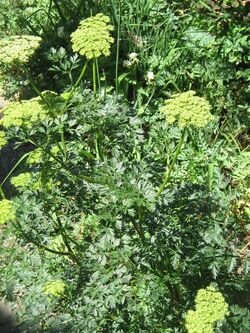Biology:Cenolophium
From HandWiki
Short description: Genus of flowering plants
| Cenolophium | |
|---|---|

| |
| Scientific classification Error creating thumbnail: Unable to save thumbnail to destination
| |
| Kingdom: | Plantae |
| Clade: | Tracheophytes |
| Clade: | Angiosperms |
| Clade: | Eudicots |
| Clade: | Asterids |
| Order: | Apiales |
| Family: | Apiaceae |
| Subfamily: | Apioideae |
| Genus: | Cenolophium W.D.J.Koch |
| Species: | C. denudatum
|
| Binomial name | |
| Cenolophium denudatum (Hornem.) Tutin
| |
| Synonyms | |
| |
Cenolophium is a genus of flowering plants in the carrot family Apiaceae (Umbelliferae). Its only species is Cenolophium denudatum (known as Baltic parsley), native to Europe and Asia. A herbaceous perennial, it grows to 1.5 m (4.9 ft) tall by 0.5 m (1.6 ft) wide, with dark green divided leaves and, in summer, many umbels of tiny pale green or white flowers on branching naked stems (hence the Latin specific name denudatum).[1] The stems are sometimes purple in colour. The flowers are attractive to numerous insects.[2]
In cultivation in the United Kingdom , this plant has gained the Royal Horticultural Society’s Award of Garden Merit[2] (confirmed 2017).[3]
References
- ↑ Harrison, Lorraine (2012). RHS Latin for Gardeners. United Kingdom: Mitchell Beazley. ISBN 184533731X.
- ↑ 2.0 2.1 "RHS Plantfinder - Cenolophium denudatum". Royal Horticultural Society. https://www.rhs.org.uk/Plants/42450/i-Cenolophium-denudatum-i/Details. Retrieved 21 January 2018.
- ↑ "AGM Plants - Ornamental". Royal Horticultural Society. July 2017. p. 17. https://www.rhs.org.uk/plants/pdfs/agm-lists/agm-ornamentals.pdf. Retrieved 24 January 2018.
Gallery
Wikidata ☰ {{{from}}} entry
 |




